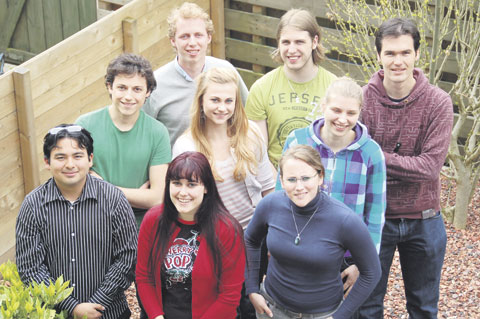This year, a TU Delft team is creating a sustainable biological solution for eradicating oil spills in salt water. The team is taking part in the International Genetically Engineered Machine (iGEM) competition, a worldwide Synthetic Biology competition for undergraduate university students.
Synthetic Biology is a relatively new field, where biology and engineering combine to achieve new biological functions and systems not found in nature. Previous TU Delft teams have won several medals. The pressure is high to uphold that reputation.
The goal of the iGEM competition is to create a catalogue of biological systems, like the ability to live in salt water, in order to provide a standardized characterization of these systems. Then, researchers around the world can use the catalogue to look up the needed function in a bacteria.
The 2010 team is focusing on oil degradation by altering E.coli bacteria to process oil in a salty environment. E.coli is a fast-growing and well-researched bacteria; some kinds of it are already capable of processing oil. Parts of an algae are capable of living in salty environments. Through recombining the DNA of this bacteria and the algae, the team of researchers aims to create bacteria that can clean water contaminated by oil.
Chemicals are usually used to deal with oil spills, but they in turn pollute the water. Using synthetic biology, the team is looking for a better alternative.
The student researchers working on this project also face ethical issues. Critics of synthetic biology say it is dangerous, since unexpected outcomes might occur. However, the students claim their research is safe. The lab equipment used for this project cannot facilitate the creation of dangerous bacteria.
Next year there will be another iGEM team. So, if you are interested in synthetic biology and looking for a new challenge in competing with the top students around the world, you should think about joining the IGEM team next year.
Dat zei de minister maandag bij de opening van het academisch jaar aan de Universiteit Twente. “Ons stelsel van hoger onderwijs begint uit zijn voegen te barsten. De toestroom van studenten is veel groter en diverser geworden. Moet er geen breder stelsel komen?”, oppert Plasterk.
Hij wijst erop dat in 1950 vijf procent van de bevolking hoger onderwijs genoot, terwijl dat nu 47 procent is. Hbo en universiteit lopen volgens hem tegen grenzen op.
Bovendien ‘ontwikkelt zich een reële behoefte’ aan toegepast onderzoek in het hbo, vindt Plasterk, en zijn er hbo-studies die dicht tegen beroepsgerichte universitaire studies aanzitten. Hij denkt dat het stelsel ‘flexibeler en diverser’ kan worden.
Volgens voorzitter van de hbo-raad Doekle Terpstra is het idee dat universiteiten voor de wetenschap opleiden en hogescholen voor beroepen ‘niet meer van deze tijd’. Ook van afgestudeerde hbo’ers wordt meer dan alleen praktische kennis verwacht. “Ze moeten hun eigen werkveld kunnen vernieuwen en hebben daarbij onderzoeksvaardigheden nodig. Studenten moeten daar tijdens hun opleiding op worden voorbereid.”
VSNU-voorzitter Sijbolt Noorda noemt in NRC Handelsblad Plasterks plan ‘een goed idee’. ‘Als de helft van de studenten hoogopgeleid moet zijn, is het een gekke gedachte dat ze allemaal op dezelfde manier worden opgeleid.’
Die uitspraak leidt tot verbazing bij TU-collegelid Paul Rullmann. “In Nederland heb je al veel mogelijkheden. Het afschrijven van het binair stelsel als te beperkt, gaat me te snel. Zeker als ik bedenk dat we al een kort hbo hebben, we nog maar aan het begin staan van de bachelor-masterstructuur en de meeste universiteiten nog geen harde knip hebben.”



Comments are closed.